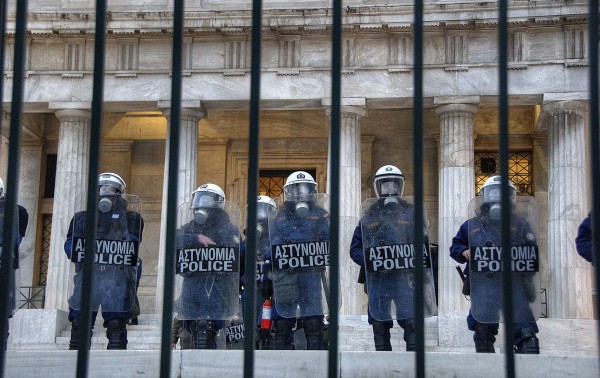Since protests began in Spain, Athenians started to demonstrate in Syntagma Square (25th of May 2011), together with demonstrations in more than 30 cities across the country. We spent more than a month with a consistently large crowd gathered daily at the bottom of the square, where open assemblies practicing direct democracy were organized. The open meetings continued for about two months.
On the 29th of June there was a debate in Parliament in order to sign the “Pact of stability” (an agreement between the first and second memorandum) that was going to cause a big loss to our income and place assets of great importance for the national economy in severe danger. The mobilization was great. Hundreds of thousands of protesters gathered in the streets with a clear intention to act in a nonviolent direction. And for the first time Greek police showed its true face: extremely large quantities of tear gas sent dozens of demonstrators to hospital and violently broke up a march attended by pensioners, young people, parents with their children, etc.
By the end of the summer of 2011, open assemblies were created in various neighborhoods, mostly around the center of Athens. This helped some very interesting efforts of non-cooperation and solidarity among people to become stronger: time banking, bartering, refusal to pay extra taxes embedded in electricity bills, public transport ticket exchange, food and clothing collections for the growing number of homeless people, etc.
Meanwhile we had an unelected government coalition of 3 political parties, and a banker for Prime Minister. He led the country into the second memorandum, scheduled to be signed in the middle of February. On the 12th of February 2012 thousands of demonstrators gathered in Syntagma Square to express their opposition to the austerity measures. Greek police started to throw tear gas right from the start of the peaceful demonstration, in order to prevent the demonstrators approaching Parliament. As the demonstrators suffered from the continuous fumes, they withdrew to protect themselves and then time and again advanced. At this point we witnessed the most violent outbreak since December 2008 which was covered by all the TV stations across Europe, presenting the demonstration as violent. Until that moment, we believed we needed a mass movement to show its refusal to accept the memorandum. At that rally we realized that this way did not work, because the state, through the brutality of the Greek police, easily managed to suppress it. It was clear that we needed new forms of struggle.
One month later the government announced elections. People were encouraged, hoping that this was the moment to show again their massive opposition through our votes, but the electoral campaign also had the effect of focusing Greeks on domestic politics, watching television and concentrating all debate there.
In the May 2012 elections the coalition political parties lost a great percentage of their power. Syriza, a left party against the austerity measures, gained almost 17%. The neo-Nazi party Golden Down entered Parliament with an outrageous 7%. It was not possible to form a government, so new elections were held forty days later, with a terrorist campaign carried out by the mass media to scare people and prevent them from voting for Syriza.
In June 2012, although Syriza received 27%, the results of the elections sealed a new coalition between the “left” and right parties that led Greece in the same direction of memorandums, enslavement and recently the slaughter of every labour right.
The three-party coalition government was elected by promises that were never kept and nowadays unofficial unemployment is over 30% (53% for young people under 25). Greek society has been economically transformed by difficulties in the standard of living and hunger is now common. Many kids faint at school because they are starving, thousands of people are homeless and millions of people are wondering how they will keep warm through the coming winter…
The economic crisis has created a new psychological background in the country. It is clear that people more than ever are “provoked” by the crisis to choose between humanism and anti-humanism.
The anti-humanist block is largely expressed by the Nazis of Golden Dawn, who after the elections in June have greatly increased their cruelty and number of attacks, directed mostly towards immigrants. Of course politicians, police repression and banks belong to the same block of anti-humanism.
On the other hand lots of spontaneous base organizations show the increase of solidarity, as a necessity for survival. Initiatives connected with civil disobedience, active nonviolence (for example the growing “Network of Schools for Nonviolence) demonstrate an impressive turn of the people towards new ways of expression in the social and personal field.
The majority of the Greeks are still numb and inactive, but the speed of events and the number of stimuli coming from outside are changing the profile of the country day by day…
Marianella Kloka, Kostas Klokas
World without Wars Greece










